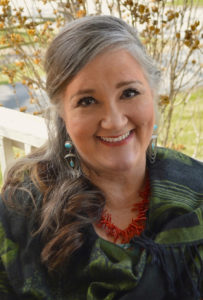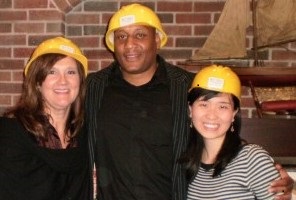 Elizabeth Leake is a project manager of advanced cyberinfrastructure at Texas A&M University. She founded STEM-Trek, a global, grassroots nonprofit organization that supports travel, mentoring and professional development opportunities for science, technology, engineering and mathematics scholars from underrepresented groups and regions.
Elizabeth Leake is a project manager of advanced cyberinfrastructure at Texas A&M University. She founded STEM-Trek, a global, grassroots nonprofit organization that supports travel, mentoring and professional development opportunities for science, technology, engineering and mathematics scholars from underrepresented groups and regions.
Prior to founding STEM-Trek, Leake served as a high-performance external relations specialist and storyteller. She first became engaged with advanced cyberinfrastructure (CI) when she led a nationally distributed team of 18 science and technology communicators as the U.S. National Science Foundation TeraGrid project’s external relations coordinator. In that role, she was point facilitator for the DEISA/PRACE and TeraGrid/XSEDE EU-US HPC Summer Schools in Catania, Italy and South Lake Tahoe, California-U.S. That experience sparked a lifelong interest in scholarly travel. Her fascination with high-throughput, cloud-enabled and VM technologies was ignited when she corresponded for U.S. Open Science Grid All Hands meetings and European Grid Infrastructure (EGEE/EGI) Community Forums (2008-2012).
HPC Conference Committee Work
- Practice & Experience in Advanced Research Computing (PEARC) Student Program Committee (2017, 2020-22).
- Program Chair, Southeast Wisconsin HPC Consortium’s (SeWHiP) Data Symposium 2012
- Supercomputing Conference (since SC08) Student Program, Communications, Doctoral Showcase and Mentor-Protégé committees; Deputy Chair SC14 Broader Engagement Program. Facilitated co-located events since 2015.
- “Careers in Cyberinfrastructure” panel at the Advancing Research Computing on Campuses (ARCC’16) conference sponsored by the U.S. National Center for Supercomputing Applications (NCSA) – presentation titled “How to Recruit & Retain Gen-Y Unicorns.”
- Judge, International Supercomputing Conference Student Cluster Competition (ISC-SCC) since 2019
- Judge, Winter Classic SCC, 2020.
Correspondent
- CERN GridCast, 2009-2011.
- South African Centre for HPC Annual National Meetings, 2012-present.
- National Center for Supercomputing Applications (NCSA) Industry Conference (2018-20)
- NCSA Center for Digital Agriculture Conference, 2019-20.
- UChicago Urban CCD Convenings, 2012-15.
- Tabor Communications Contributing Editor since 2008.
Many of Leake’s EGI stories were featured by International Science Grid This Week (iSGTW/ScienceNode), and CERN’s GridCast. As a frequent contributor to HPCwire, she chronicles the activities of the South African Center for HPC, Square Kilometer Array Project and Southern African Development Community (SADC) HPC Forum. Through her involvement with the International Supercomputing Conference (ISC) student program and communications team, her stories were featured by ISC’s Top500.
Invited Speaker
- HPC Knowledge Meeting (HPCKM18) – Barcelona, Spain
- ACTNext (TechTalks19) – Iowa City, Iowa
- Third International Conference on Modern Mathematical Methods and High-Performance Computing in Science and Technology conference (M3HPCST’20) – New Delhi, India.
- Keynote, British Computer Society Open-Source Specialist Group Annual Meeting on Open Source and Inclusivity, April 2022 – Remote.
- Keynote, Rocky Mountain Advanced Computing Consortium (RMACC’22) 12th Annual Symposium, August 2022 – Boulder, Colorado.
STEM-Trek Beginnings

2012 Friendraising event: “Building Community”
Leake and others from the HPC community founded STEM-Trek in 2011-12 when federal travel budgets had been cut in response to a case of abuse by a U.S. government agency. As the global economy suffered, a similar travel ban was issued in many European countries along with widespread austerity measures. Travel was doomed to be considered a luxury, and few considered how the decisions would impact STEM education programs, science diplomacy and international research collaborations.
At the campus level, cuts were often inequitable. While senior personnel could justify conferencing, fewer opportunities for students or early-career professionals were supported. Consequently, they miss the opportunity to present their work, train in the use of advanced technology, learn new methodologies, and expand their professional networks. The founders worried the situation would impede workforce development. Fewer multinational collaborations might be formed, international trust could erode and conference education program neutrality would suffer if a larger percentage is sponsored by commercial enterprises.
